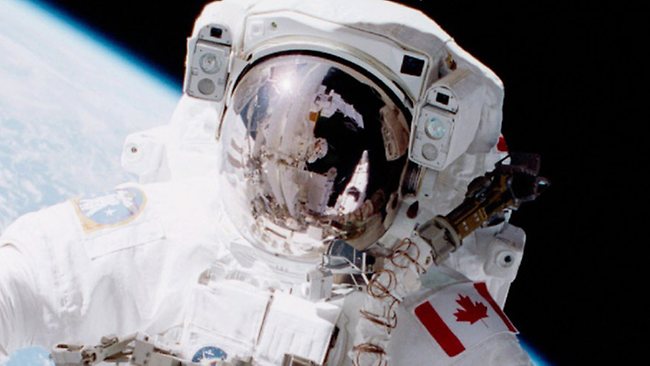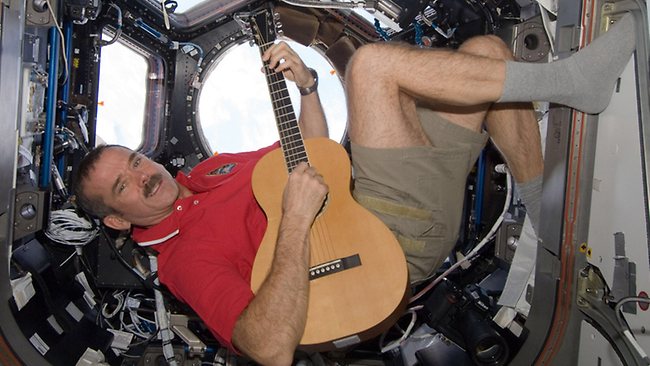Astronaut Chris Hadfield reveals worst fear 'floating off into space'
SPACEMAN Chris Hadfield reckons he has the "job full of dreams" but reveals his biggest fear is eerily similar to a plot from a hit movie.

OF THE 7 billion people on the planet, only 530 have been in orbit, and less than half of those have ever physically been outside a module, walking and working and floating in space.
No film in recent memory has sparked as much terror and fascination with the idea as Gravity, starring Sandra Bullock as an astronaut who becomes untethered from her space station, possibly lost forever.
It's the fate every astronaut dreads: To quote Col Chris Hadfield, author of the new memoir An Astronaut’s Guide to Life on Earth (Little, Brown), "My number one concern . . . is to avoid floating off into space."
Next on that list: avoiding fatal mechanical defects during launch, fire in the spacecraft, an astronaut becoming gravely ill or dying while in orbit, loss of communication with ground control, a calamitous event occurring back on Earth while you exist beyond the bounds of the planet, and burning up upon re-entry.
Other than that, Hadfield says, it's the most magical experience a human being could ever have.
'I’VE ONLY GOT A COUPLE MORE MINUTES TO LIVE'
Hadfield, a Canadian, became an astronaut in 1992 and says he's never encountered anyone who doesn't regard it "as a job full of dreams." He first flew in space in 1995, but it wasn’t until his second mission, in April 2001, that he left the ship and walked in space.
He is a genius, a man of science and technology and no first-timer to the universe. "Intellectually, I'd known I was venturing out into space," he writes, "yet still the sight of it shocked me, profoundly."
He describes the primal awe and fear of pushing out into the void: "How is this possible?" he writes. "What's coming out of my mouth is a single word: 'Wow.' It's like being engrossed in cleaning a pane of glass, then you look over your shoulder and realize you're hanging off the side of the Empire State Building, Manhattan sprawled vividly beneath and around you."

Until that moment, Hadfield writes, he had never truly experienced space. Now, here he suddenly was, attached to a spaceship orbiting the Earth at 17,500 miles an hour, tasked with helping to install a robotic arm on the International Space Station. His training kicks in, and with extraordinary mental discipline, he redirects his attention away from "the astonishing beauty of our planet, the black velvet bucket of space brimming with stars," and gets to work.
During this task — a project planned and executed in years-long simulations back on Earth — Hadfield will tear up, and it will nearly kill him.
Hadfield is out in space for five hours with fellow astronaut Scott Parazynski when it begins. He is attached to the ISS with a tether, his feet secured in restraints, working a drill when his left eye begins to burn so badly that he reflexively brings up a hand to rub it, smacking his helmet.
Since Hadfield can still see out of his right eye, he says nothing to ground control: He does not want to leave outer space. And for all his training, nothing can prepare him for the real-time realizations he is having: Oh, right, yes, there's no gravity in space, and so his tears aren’t going to fall. They are building and building on the surface of his eye, creating a swampy mess that is blinding him.
And now they are migrating over to his right eye, both so clouded and burning that he can't stop himself from shutting them both. "In the space of just a few minutes," he writes, "I've gone from 20/20 vision to blind. In space. Holding a drill."
Hadfield has no choice and utters those famous words: "Houston, I have a problem."
His fellow astronaut is still working away, deliberately displaying no distress, while Hadfield tries to take advantage of his closed eyes: He imagines he's back on Earth, in his home, in his bed, under the covers, the closest he could get to being back in the womb — the exact opposite of the gaping, limitless void that has no regard for his fate.
He can hear the frantic whispering among the scientists at CAPCOM; every time they ask him a question, they need to consult among themselves before giving him an answer or an instruction, which means that no one in the history of space travel has ever experienced this before.
The diagnosis, reached in less than five minutes: Hadfield's spacesuit is contaminated with lithium hydroxide, which is used to eliminate carbon dioxide. That Hadfield’s eyes are so inflamed means there’s likely a leak.
"I've only got a couple more minutes to live," he writes.
Ground control tells him he must open his air valve — essentially, expose himself to space — to try and disperse the contaminant. He has to force himself: It runs counter to his primal survival instinct, having to expel his own air supply into outer space.
"So now I’m blind, listening to a hissing noise as my oxygen merrily bubbles out into the universe," he writes.
It works. Hadfield is overjoyed to still be out there, and gets right back to work installing the arm.
Read more about astronaut fears 'floating off into space' at the New York Post.



